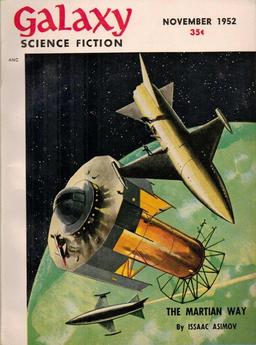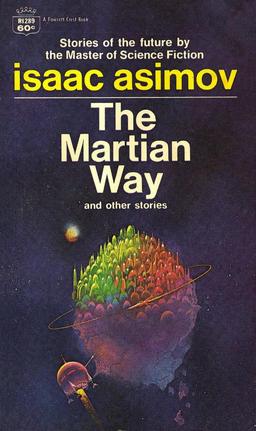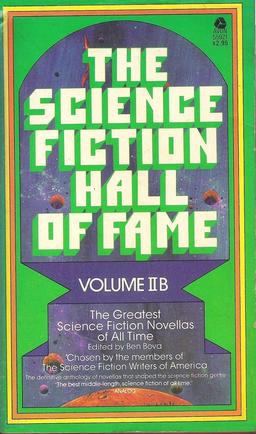Galaxy Science Fiction, November 1952: A Retro-Review
 The November 1952 issue of Galaxy Science Fiction features cover art by Jack Coggins of an Earth satellite. This satellite is more like a space station than satellites I typically think of. But considering that the first artificial satellite (Sputnik 1) wasn’t launched until about five years after this issue hit newsstands, everything was still left to the imagination at this point.
The November 1952 issue of Galaxy Science Fiction features cover art by Jack Coggins of an Earth satellite. This satellite is more like a space station than satellites I typically think of. But considering that the first artificial satellite (Sputnik 1) wasn’t launched until about five years after this issue hit newsstands, everything was still left to the imagination at this point.
Before I jump to the fiction, I want to comment on Willy Ley’s “For Your Information.” In part of the column, he discusses Mars and its vegetation. I thought that was rather odd or presumptuous for him, but at this time, scientists were observing coloration on the planet’s surface that changed seasonally. That coloration plausibly suggested vegetation, and if there’s vegetation, what other life might be there? Then Mariner 4 did a fly-by in 1965, showing reality. Additional Mariner spacecraft confirmed more of the same — that Mars was a dead planet.
I wonder how many people were crushed by this, including authors of science fiction. There might have been some who feared Martians coming to destroy us and felt relief. But I also think that the possibility of life on Mars offered a kind of hope to some — that humanity wasn’t completely alone. With the truth of Mars revealed, that hope had to extend beyond the neighboring red planet. It will be interesting to see how science fact continues to influence science fiction, not necessarily by devestating our hopes and dreams but by helping to reshape them into new possibilities. And even without life on Mars, the planet still has an allure to it — a vacant planet that beckons to be explored and perhaps settled.
“The Martian Way” by Isaac Asimov — Mario Rioz and Ted Long work together on a small ship near Mars, tracking and scavenging the abandoned shells of Earth spacecraft. These jettisoned pieces are essentially rocket stages cast off as part of the flight, and they contain metal the humans on Mars can reuse.
A rising politician on Earth named Hilder points out that Mars doesn’t reimburse Earth for the shells, and the monetary investments will take many years to return. But worse than that, Mars can never replenish the water it takes from Earth to propel its ships. As Hilder’s voice gains more attention, other politicians begin mimicking him, which leads to new policies that prevent the scavenging of shells.
Without solid work, Ted begins to plan for Mars, to figure out how they can supply their own water and break all ties with Earth. The only probable source is to go farther out in the solar system, which would take months of travel, longer than anyone has ever endured in space before. But Martians are used to tough situations, hewing out life on a rugged planet, and he knows a few scavengers who are looking for a job.
 It took me a bit of time to get into the story because there’s some info dumping. But the story is worth it. There was a gritty, real sense to the plot, and the characters had some distinctiveness to them. This novella was included in The Science Fiction Hall of Fame, Volume Two B as one of the best novellas up to 1965.
It took me a bit of time to get into the story because there’s some info dumping. But the story is worth it. There was a gritty, real sense to the plot, and the characters had some distinctiveness to them. This novella was included in The Science Fiction Hall of Fame, Volume Two B as one of the best novellas up to 1965.
“Warrior Race” by Robert Sheckley – Two men land on a planet in the Cascella system to refuel their ship. A previous exploration team left a cache of fuel in a metal spire, but the indigenous people protect the structure as a shrine. When the two men try to retrieve fuel from it, the natives start a battle, not by attacking the men but by slaying themselves.
I liked seeing a different culture in an alien race. It was also interesting seeing a story where the characters aren’t so much concerned for their own safety as they’re concerned for the safety of the aliens.
“Sugar Plum” by R. Bretnor – A neo-Victorian family purchase a planet to live on. Though they’re warned that the planet once belonged to a pirate, Charles (the head of the family) assures everyone of their safety. Beyond the danger of piracy, the family must deal with how the planet affects them over time, drawing them away from their decent and proper ways.
This is a fun story. Just picture a Victorian family in space, and that’s a sit-com by itself. The author’s full name is Reginald Bretnor, and he wrote a considerable amount of fiction over his lifetime.
“A Thought for Tomorrow” by Robert E. Gilbert – Orville Potts is in a psychiatric hospital, desperately wanting to escape. He can think deeply enough to picture himself in other places or periods of time, but they’re always lacking enough definition to take him there. If he could simply focus on the proper setting, he could go.
Gilbert wrote a good story – accurate to the experience of living in such a place (or at least written well enough to make me think it’s accurate). The characters and setting all felt real. This is another tale, however, where I would have preferred that science be left out of the explanation of what the protagonist attempts to do. Instead, I would have just attributed it to magic (or leave it unexplained) and enjoyed a slightly better tale. But this is Galaxy Science Fiction, after all.
“The Altar at Midnight” by C. M. Kornbluth – The protagonist strikes up a casual friendship with a young spacer. The young man has the appearance of long hours in space – broken veins all over his face, a result of using the Bowman Drive. It’s a troubling and isolating fate, but the spacer says it’s lucrative, so they keep going, despite what it does to them. All the protagonist can do is listen and sympothize.
 It’s a moving tale with a good punch at the end. Kornbluth was a talented author, and it’s sad that he died when he was 34 (in 1958). According to wikipedia, Kornbluth was scheduled to interview for the editor position at The Magazine of Fantasy & Science Fiction. He had to shovel his driveway first, and that put him behind, so he raced to get to his train. On the platform of the train station, he had a heart attack.
It’s a moving tale with a good punch at the end. Kornbluth was a talented author, and it’s sad that he died when he was 34 (in 1958). According to wikipedia, Kornbluth was scheduled to interview for the editor position at The Magazine of Fantasy & Science Fiction. He had to shovel his driveway first, and that put him behind, so he raced to get to his train. On the platform of the train station, he had a heart attack.
“The Misogynist” by James E. Gunn – Harry tells humorous stories like no one else, partly because he can do so in a dry manner, rarely showing a smile. At dinner one night, he shares his thoughts with the protagonist about women – that they aren’t actually from Earth. Unfortunately, he never gets to the punchline before their wives join them, and even after the protagonist shares the joke with them to egg him on, Harry clams up. In fact, the joke might never be completed; Harry’s wife leaves a message at the office the next day that Harry had a stroke or heart attack and wouldn’t be back.
I get that the story was tongue-in-cheek, but I just didn’t find it entertaining.
“Runaway” by William Morrison – Plato lives on Venus with other pupils at his dormitory. He dreams of space adventures and decides it’s time to escape. No more schoolwork or hearing the others laugh about his name. His adventure starts now.
This was my favorite story of the issue. I could feel Plato’s thrills with each stage of his plans. I won’t say more than that, but I highly recommend reading this one if you have a chance.
“Command Performance” by Walter M. Miller, Jr. – Lisa is at home alone; her husband is traveling for work, and her children are with her mother. Everything seems to be well with her, but she feels disconnected and unhappy, and she can’t identify why. A young man comes to see her and explains that they’re not like the others — they have the ability to share each other’s thoughts. Lisa sends him away, but she can’t shake the idea that he can connect with her whenever he likes. What is it that he could want with her anyway? And is this the disconnection she’s always felt?
The story has a quick pace to it, and there’s good tension. But I was surprised that the story was sensual. First, I didn’t expect to find something like this in Galaxy (I don’t mean to suggest it wasn’t over-the-top, but for 1952 it was a bit surprising). Second, I didn’t expect to find something like this written by Walter M. Miller, Jr., but perhaps I haven’t read enough of his works to understand what he liked to write.
Matthew Wuertz’s last retro review for us was the October 1952 issue of Galaxy Science Fiction.
[…] Matthew Wuertz reviews Galaxy Nov. 1952 at Black Gate. […]
I believe this is the second time Willy Ley mentioned the “generally accepted” notion of plant life on Mars. Ouch. The best of us make big mistakes. His contributions to science and the space program earned him a nice posthumous honor: a crater named for him on the moon, one that looks forever out to the stars on the far side from earth. Mr. Ley missed the moon landing by about a month (he died in June of 1969), but he might have taken comfort in knowing that he didn’t make the only false prediction in this issue. H.L. Gold speculates (though tongue-in cheek) in the editorial about the first words said by a human on the moon. To my recollection, Neil Armstrong did not lead with “Stop shoving! Think I want to break a leg this far from home?”
I tried to find the Ley Crater on Google Earth (the moon option of course), but the search engine doesn’t seem to have it in inventory.
I always enjoy Isaac Asimov’s work, whether fiction or non-fiction, and in any of many subjects that he wrote about. “The Martian Way” starts in the gritty and competitive field of space mining, but then takes a jump in time to when former adversaries are now trying to save their planet and their way of life. I enjoyed this one from start to finish and I loved the ending. This story illustrates yet another reason to hate politicians.
I am not sure I totally bought into “Warrior Race.” Guilt is a powerful weapon, but if I am stranded on a strange planet and my only way to get away again is to endure the suicide of the indigenous people, I think I would get over my guilt in a reasonable amount of time and sleep just fine when I got home. I am not sure I found the ending plausible, or if I even understood it completely.
I come across Reginald Brentnor’s work quite a bit as I work my way through back issues of F&SF (500+ read and counting). He is not my favorite. Maybe the humor made more sense back in the day, but I mostly just roll my eyes when I see his name and try to go in with an open mind. He is certainly not as bad as some of the humor writers from Ray Palmer’s magazines (coughcoughHAL ANNAScoughcough).
I did like “Sugar Plum,” much more than I usually like Mr. Brentnor’s work. The characters are predictable and the premise made me groan (“not unihabited, but uninhibited!”). Despite myself, I enjoyed watching the plot unfold and didn’t hate the ending.
My judgement might have been influenced by the setting in which I read this magazine. My wife and I kayak across a lake in Oregon each summer, string up our hammocks, and read while feeling the sun and breeze come off of the water in our uninhabited (uninhibited?) cove. How could you hate any story in that setting? I’ll be back to work when I write next month’s response, so Mr. Brentnor may have just gotten in under the wire.
“A Thought for Tomorrow” was a nice read also. I agree that we don’t have to have some scientific basis for every speculative event every single time. That may have been the editor’s influence, though that mentality is more from the John Campbell school. The ending is predictable, but it does not spoil the story.
I always look forward to Mr. Kornbluth’s stories, but “The Altar at Midnight” was not (in my humble opinion) one of his stronger works. I did enjoy the narrative and the discussion of social pressures regarding going into space versus having a normal life, but this one did not blow me away like his writing usually does.
There are far too few of his stories, as Matthew mentioned. Read the whole Wikipedia article. He was one weird dude.
“The Misogynist” is a failed attempt at humor. Perhaps issues of gender relations in the fifties made this more relevant back then, but I found this story boring, predictable, and not at all funny. Not even the hammock and the lake could save this one.
“Runaway” was not my favorite of the issue (Asimov or Miller), but I always enjoy a nice tale of escape. I was cheering for little Plato the whole way and (spoiler) was disappointed when they caught him. There had to be some kind of twist at the end, and there was in the very last sentence (last word, really), but I think the ending could have had more punch.
“Command Performance” is the complete package. A great narrative, increasing suspense and danger, and a great ending that is satisfying, unexpected, and even bittersweet in the final sentences. I am not surprised that Walter Miller Jr. could write something this thoughtful, but the racy beginning surprised me too. I have read all (I think…) of the Leibewitz stories in F&SF and I always appreciate how lovingly he writes about religion, a subject that is often tossed aside or tossed around in sf. “Command” shows that he can use his thoughtful writing in other ways.
Seriously, that first scene was HOT.
Despite my complaints, this was an excellent issue. See you next month, Matthew and everyone.
Reginald Bretnor’s most famous stories might be his many vignettes about Ferdinand Feghoot, that all end with a horrible pun. Indeed, “Feghoot” has become the accepted term for any short short that ends with a pun.
He published them mostly in F&SF, under the anagrammatic pseudonym “Grendel Briarton”.
Gus,
Thanks for your comments. It seems like we generally agreed on likes/dislikes though we disagree on favorites. 🙂
I think this was one of Galaxy’s stronger issues.
Rich,
I haven’t read any of the Feghoot stories, and I hadn’t heard that term before. I like that: Feghoot.
The Feghoot stories are short blurbs that F&SF put as filler at the end of the short stories. The humor is often dated. I usually don’t even understand the puns, and when I do I just don’t think they are funny.
Grendel Briarton is an anagram of Reginald Brentnor.
Yes, we do seem do agree on most of the stories, Matthew, but it is still fun to discuss them every month. I am discovering how hard it is be be articulate when discussing these stories, and also how hard it is not to repeat yourself! You do a great job and I am glad to be a part of this discussion.
Gus,
Thanks for the encouragement! 🙂